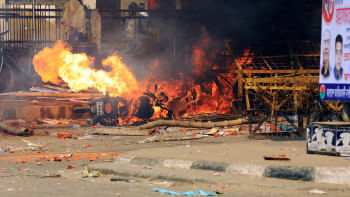Fighting on the streets cannot be the way of political parties

BNP has been conducting largely peaceful political processions recently, but the violence and cruelty that erupted on October 28 were completely unacceptable. I don't want to put all the blame on the BNP, but I do blame it for the events of that day more than anyone else. Buses were set ablaze inside the Institution of Diploma Engineers, Bangladesh, which is not a political institution. There were attacks on the residence of the chief justice—who doesn't have a political position; he is the head of the Supreme Court, an integral part of our judiciary system. Journalists were attacked.
Then, a police constable was killed. We have seen videos of how inhumanly he was beaten, with blows dealt to the head. This is not acceptable behaviour from any political party that claims to want to work for the people and believes in democracy and fair elections. Yes, the police interfered with the processions, fired tear gas, and disrupted the rally. But the BNP activists did also provoke them. Even if they did interfere in a biased way, which they have done many times in the past—despite being a part of the state, they have acted on behalf of the ruling party—there are acceptable ways of responding to that. I call on the two main political parties, which have the largest support bases, to behave. The opposition can hold demonstrations and fill the streets with its supporters, but such violence is extremely problematic.
I don't know if what happened on October 28 was intentional or whether things simply spiralled out of control. But circumstances did go against BNP. Even if it claims that Awami League provoked it, I must ask BNP why it responded in such a way. The party leaders should have had enough control over their supporters, given that they had successfully gathered a large number of people. If the rally had been peaceful, the public could have had a much more positive attitude towards them.
Then there was the ridiculous incident of a Bangladeshi-born US citizen posing as an adviser to the US president, who spoke at a press conference from the BNP office. How could such an incident take place in the office of a mature political party like BNP? His very claims were quite problematic. We are not a colony, nor a passive state of the US, that one would call on us like a child, saying that Joe Biden will "discipline" us. How could the BNP allow him to enter its office and participate in this press conference? How could BNP leaders sit with him and allow this to happen? The BNP claims that this was not pre-planned, but that implies that they have no chain of command or control.
The people around me, even those who were wondering if it is indeed time for a change, are now saying that if this is what the BNP is going to act like, they do not want them. I don't know if what happened on October 28 was intentional or whether things simply spiralled out of control. But circumstances did go against BNP. Even if it claims that Awami League provoked it, I must ask BNP why it responded in such a way. The party leaders should have had enough control over their supporters, given that they had successfully gathered a large number of people. If the rally had been peaceful, the public could have had a much more positive attitude towards them.
I am worried about the future of our political system. The political parties have no control over their members. I am not just talking about the incidents of October 28; this has been going on for a long time. In the Dhaka-17 by-polls back in July, Hero Alom was assaulted before the voting concluded. This is not the behaviour we expect from mature political parties.
Whenever there are strong allegations against any member of Awami League or BNP, both claim that those members are intruders. So why do they harbour "intruders" who do not belong to their parties or do not share their party's policies and principles? As such, BNP cannot brush off responsibility for the events of October 28 by merely calling those who carried out violence "intruders."
If this is how both parties act, how can we ensure democracy? Have we learned anything in all our years of democratic practice? Has any political party ever displayed responsible behaviour? These are pressing concerns, not just in view of the upcoming election, but for Bangladeshi politics overall.
If we want democracy and democratic practices to thrive in this country, we need a strong opposition. The government will not agree with everything the opposition believes, and that is actually normal. Similarly, the opposition will point out the government's inaccuracies and failures, hold it accountable, and question its decisions. However, fighting on the streets cannot be the way of our political parties. The people of Bangladesh deserve respect and a much more responsible strain of politics—not the kind of politics we saw on October 28.
Khushi Kabir is a rights activist and the coordinator of Nijera Kori.
Views expressed in this article are the author's own.
Follow The Daily Star Opinion on Facebook for the latest opinions, commentaries and analyses by experts and professionals. To contribute your article or letter to The Daily Star Opinion, see our guidelines for submission.

 For all latest news, follow The Daily Star's Google News channel.
For all latest news, follow The Daily Star's Google News channel. 










Comments